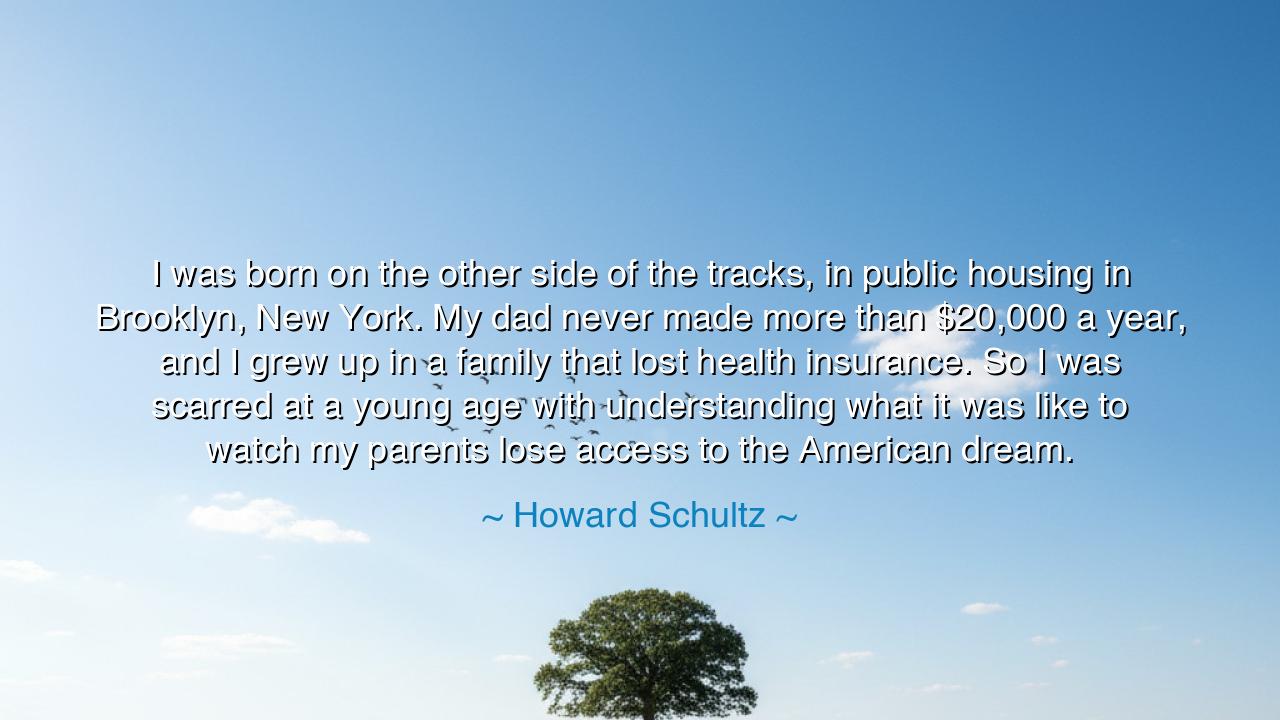
I was born on the other side of the tracks, in public housing in
I was born on the other side of the tracks, in public housing in Brooklyn, New York. My dad never made more than $20,000 a year, and I grew up in a family that lost health insurance. So I was scarred at a young age with understanding what it was like to watch my parents lose access to the American dream.






Hearken, O children of generations yet unborn, and attend to the words of Howard Schultz, who spoke with the raw honesty of one forged in adversity: “I was born on the other side of the tracks, in public housing in Brooklyn, New York. My dad never made more than $20,000 a year, and I grew up in a family that lost health insurance. So I was scarred at a young age with understanding what it was like to watch my parents lose access to the American dream.” In these words lies a meditation on poverty, struggle, and the indelible mark of early life experience, a truth as ancient as the chronicles of those who rose from humble origins to shape the world.
Consider first the weight of circumstance in youth. Schultz was born into modest means, where survival was a daily concern and the comforts of stability were distant. History is filled with similar narratives: the philosophers of Athens, the artisans of Rome, and the scholars of the Tang Dynasty all knew that adversity in youth can both wound and forge character. The trials one endures in early life become teachers, instructing in resilience, empathy, and the value of opportunity.
The phrase “lost health insurance” reflects not only material hardship but vulnerability and fear. To witness one’s family denied access to essential care is to confront mortality and injustice directly. The ancients, from the healers of Alexandria to the caretakers of medieval villages, understood that health is the bedrock of life and agency. Schultz’s words remind us that deprivation leaves lasting impressions, shaping priorities and igniting a desire to secure stability not only for oneself but for others.
Schultz also touches upon the American dream, a promise of possibility and advancement. To see that dream threatened or denied is to understand, at a young age, both the fragility of hope and the necessity of perseverance. Consider Abraham Lincoln, born in a humble log cabin, who witnessed hardship and loss, yet channeled those early scars into determination, leadership, and vision. Schultz, like Lincoln, absorbed the lessons of adversity and carried them into ambition guided by empathy and purpose.
The words illuminate the formation of values through hardship. Experiencing scarcity and vulnerability early instills a profound awareness of human need and social responsibility. Schultz’ later endeavors, including the expansion of health benefits and worker protections, are inseparable from the empathy forged in his youth. History provides parallel lessons: many great leaders, from Solon of Athens to Frederick Douglass, translated early deprivation into societal reform, proving that personal experience can seed public virtue.
From this reflection emerges a timeless lesson: adversity shapes character, empathy, and the drive to transform the world. Schultz reminds us that hardship need not diminish ambition; it can sharpen it, rooting future success in understanding, compassion, and ethical purpose. The scars of deprivation, rather than being mere wounds, can become the foundations for action that benefits many.
Practical action flows naturally from this wisdom. Reflect on the challenges you have endured and the lessons they impart. Use your experiences to cultivate empathy for those less fortunate, and seek opportunities to expand access, security, and opportunity for others. Advocate for policies, practices, and communities that reduce the vulnerabilities that once scarred you. Transform the pain of your past into purpose and service, for therein lies true strength.
Finally, remember the eternal truth: our beginnings do not define our potential, but they shape the values, empathy, and determination we carry forward. Howard Schultz’s words are a call to courage and conscience: let your early struggles guide you toward creating a world where opportunity, security, and dignity are available to all, and let your experience forge a life of purpose and lasting impact.
If you wish, I can also craft a narration-ready version of this reflection, with rises and falls that emphasize the heroic struggle, empathy, and wisdom embedded in Schultz’s insight.






AAdministratorAdministrator
Welcome, honored guests. Please leave a comment, we will respond soon